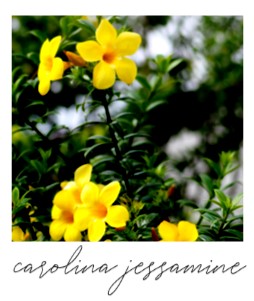
Download .pdf version
Columbia, SC--In early February, bright, canary yellow, trumpet-shaped flowers appear terracing along fences and walls. These flowers resemble the honeysuckle, but they are not in the least bit edible. The Carolina jessamine, Gelsemium sempervirens, is a native vine that produces a sweetly-scented yet highly toxic flower. Also referred to as the yellow jessamine, yellow jasmine, and Carolina jasmine, Carolina jessamine serves as South Carolina’s state flower. Jessamine and jasmine are used interchangeably, but in Joint Resolution No. 534 that established South Carolina’s state flower in 1924, the plant is described as Carolina jessamine. The flower is featured on the South Carolina state quarter, along with the Carolina wren and the cabbage palmetto tree.
Carolina jessamine has a rich history of use, notably among the Algonquian-speaking Native American tribes. The Carolina Algonquian were able to use nearly every part of the Carolina jessamine, and tinctured the plant into a remedy for malaria and other fever diseases. Carolina jessamine flowers were also weaponized; the petals could be steeped into a fragrant tea that would cause a nearly instant paralysis. The flower’s toxicity withstood the test of time, and in 2012, it was used by a Chinese agricultural official, Huang Guang, to poison Chinese billionaire and forester Long Liyuan of the Guangdong province. Guang was alleged to have added the poisonous herb to a stew at a restaurant just a week after Long accused him of embezzling money. Despite its violent past, the essential oils of Carolina jessamine can be extracted and incorporated into perfumes and fragrances, as well.
The most likely victims of the vine’s poison are children who mistake the plant for honeysuckle and suck the nectar. All parts of the plant are poisonous if ingested, and, while uncommon, those with skin sensitivities can have an allergic reaction to the plant’s sap.
Though more research is needed on the way pollinators interact with the flower, it is known that the nectar can be toxic to honeybees. As long as the flower is surrounded by several other flowering plants, honeybees preferentially forage from the safer species. Eastern tiger swallowtails and Eastern carpenter bees are known to sip the nectar of the Carolina jessamine.
Carpenter bees and bumblebees are too big to fit inside the narrow trumpet-shaped flowers, so they “nectar rob” by chewing small holes in the base of the flower to sip the nectar without providing pollination services to the plant.
Most wildlife, such as deer and rabbit, avoid the plant because of its toxicity. However, dogs and livestock occasionally fall victim to the plant’s poison, so use caution when planting Carolina jessamine near domesticated animals. Nonetheless, Carolina jessamine is a popular addition to a landscape due to its attractiveness and low maintenance.
The vine can grow 20-30 feet tall or wide and is popularly used to decorate porches, mailboxes, and entryways. It can even make a good ground cover along a steep slope to help control erosion. Full sun exposure will result in denser foliage. The Carolina jessamine prefers well-drained and rich soils, but the vine can tolerate periods of drought once established.
The February-blossoming of Carolina jessamine hints that spring is just around the corner, and its sweet scent adds a special something to any winter scene patiently waiting to spring into action!
References: Clemson Cooperative Extension, North Carolina State University, Hilton Pond, University of Florida, Carolina Algonkian Project, British Broadcasting Company, University of Texas
Download .pdf version
# # #
Conservation Districts are political subdivisions of state government under the local direction of five-member Boards of Commissioners. In South Carolina, Conservation District boundaries conform to County boundaries. The Richland Soil and Water Conservation District promotes the wise use and care of natural resources for long-term sustainability.
Contact
Richland Soil and Water Conservation District
2020 Hampton Street, Room 3063A
Columbia, SC 29204
Phone (803) 576-2080
Fax (803) 576-2088
E-mail soilandwater@rcgov.us
Facebook www.facebook.com/rswcd